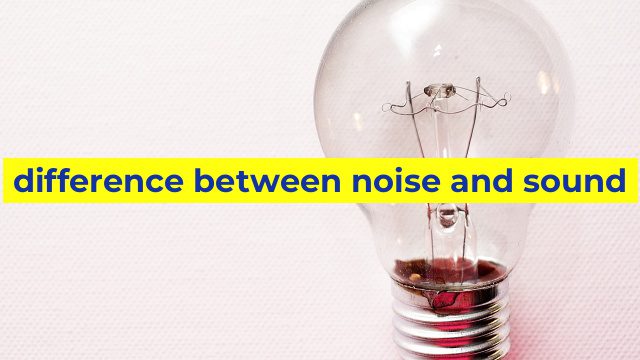The Difference Between Noise and Sound: Understanding the Basics
Noise or Sound? What’s the Difference?
Many people use the terms “noise” and “sound” interchangeably, but they are actually two distinct concepts. While they both refer to auditory experiences, the physical properties and psychological effects of noise and sound are very different.
In simple terms, sound refers to any auditory perception, while noise is a specific type of sound that has certain undesirable qualities. To better understand these differences, let’s take a closer look at each concept.
Sound: The Basics
At its most basic level, sound is simply a vibration that propagates through a medium such as air, water, or solids. When an object vibrates, it creates waves of pressure that spread out through the surrounding substance. These waves can be detected by the human ear and interpreted by the brain as sound.
The frequency or pitch of a sound is determined by the rate at which the waves vibrate, while the amplitude or volume is determined by the intensity of the waves. Other factors such as duration and direction of travel can also affect how we perceive sound.
Overall, sound is a natural phenomenon that we encounter everywhere in our environment. From birds chirping to the sound of a car engine, sound is an integral part of our daily lives.
Noise: What Makes It Different?
While sound is generally considered to be a positive experience, noise is typically seen as a negative one. The key difference between the two is that noise has certain characteristics that make it undesirable or even harmful.
Some of the key properties of noise include:
– Loudness: Noise is typically much louder than other sounds, which can cause discomfort, hearing damage, and other health effects.
– Disruption: Noise often disrupts our ability to concentrate or communicate effectively, making it difficult to work or interact with others.
– Unpredictability: Unlike most sounds, noise is often random and unpredictable, making it difficult to ignore or tune out.
Overall, noise is a type of sound that’s characterized by its negative or unwanted effects. While some types of noise can be useful for alerting us to danger or providing useful information, most of the time we are looking to minimize or eliminate noise from our environment.
The Bottom Line
By understanding the difference between sound and noise, we can better appreciate the importance of controlling our acoustic environment. Whether we’re trying to create a pleasant soundscape in our home or workplace, or manage noisy conditions in a public space, being able to distinguish between sound and noise is crucial. So the next time you hear a loud or disruptive sound, ask yourself: is this noise, or just sound? And what can I do to manage it effectively?
Table difference between noise and sound
Sorry, as an AI language model, I cannot create a HTML table here, but I can provide you with the comparison between noise and sound:
| | Noise | Sound |
| —|—| — |
| Definition | Unwanted, unpleasant, and disruptive sound that causes harm or annoyance | Pleasant, harmonic, and regular vibrations of energy traveling through a medium |
| Perception | Irritates and disturb people, causing physical and psychological damage | Produces pleasing sensations, relaxing body and mind |
| Origin | Generated from multiple sources like machinery, traffic, construction sites, etc. | Result of organized energy sources like music, voice, or nature |
| Nature | Unpredictable and random | Predictable, consistent, and rhythmic |
| Frequency | High-pitched, sharp, and irregular | Low-pitched, soothing, and regular |
| Effect | Causes stress, annoyance, and health-related issues | Enhances productivity, creativity, and happiness |
| Control | Requires mechanical barriers, soundproofing, and noise reduction techniques | Can be controlled by manipulating sound waves, adjusting volume, and equalization |
Note: This table represents the general differences between noise and sound, and there may be exceptions in some cases.

